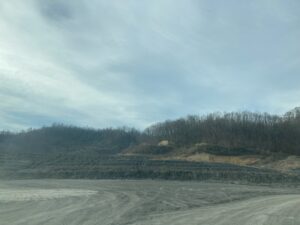
A mining company is planning to extract coal from a mountain in East Tennessee this year.
Hurricane Creek Mining has applied for a permit to mine about 650 acres of land on a mountain in Claiborne County. The mining would occur in an area north of Knoxville that is part of protected land managed by The Nature Conservancy.
Members of the public can comment on the project until Jan. 19. The state will accept emailed comments to [email protected].
Coal mining on a mountain
Hurricane Creek Mining intends to extract coal through contour mining, a method of surface coal mining that follows the contours of a mountain or hill. This means the proposed acreage represents winding strips of mining as opposed to a single chunk of land.
To access the coal layer, the company will have to cut away the rock, soil and trees above it. Then, the company will separate the coal layer into usable coal and toxic leftovers, sometimes called tailings, which will be stored in about 30 artificial ponds.
 Submitted
Submitted Rock, soil and vegetation were removed for a coal mine in Claiborne County, Tennessee.
After the mining is complete, the company will be legally required to restore the land to its natural contours and vegetative state.
In recent years, however, that last step has often been skipped in Tennessee. More than two-thirds of coal mine permits in the state are in bond forfeiture — meaning the responsibility for cleanup has been transferred to the state and the cost could fall to taxpayers.
“It seems pretty clear that there’s not a solid market for coal and that a lot of the other permit holders in the state are facing bankruptcy and bond forfeitures,” said Gabe Schwartzman, an assistant professor of geography and sustainability at the University of Tennessee, Knoxville. “The likelihood that this mine would end up in that situation seems high.”
More: Two-thirds of Tennessee coal mine permits are in bond forfeiture | WPLN News
In other words, a lot of mines are basically abandoned, and potential pollution from those sites might not be monitored. Coal mines, whether active or abandoned, create air and water pollution and can increase flooding risks to nearby communities.
Tennessee’s last new coal mine
Tennessee last approved a new coal mine in 2020. The mine is in Campbell County, next to Claiborne County, and was initially owned by a South Carolina company called Davis Creek Energy, LLC. Eight months after getting the permit, the company got a notice of violation for not submitting discharge reports — which are the results of water sampling for various pollutants.
Three months later, the permit changed ownership to Alden Resources, LLC, which is based in Kentucky. That company got a notice of violation in 2022 because of the following:
- “untreated mine wastewater” was escaping the mine site through a sinkhole
- wastewater ponds and ditches were not constructed prior to the disturbance of land
- systems for the collection and treatment of mine wastewater and stormwater were “not adequate”
- “uncontrolled sediment” was entering or had the potential to enter protected waters
In 2023, the company also got a notice of violation after the state was notified of a landslide. State officials confirmed a landslide near a road and pond that connected to a protected waterway and concluded that a “leaking pond” was the likely cause of the landslide.
The new permit
Until last year, a Kentucky-based company, Apollo Fuels, Inc., had a permit for surface coal mining with the U.S. Army Corps of Engineers for the site of the proposed coal mine in Claiborne County. That permit was set up to be operational between 2014 and the end of 2024.
Last June, the permit was transferred to Hurricane Creek Mining, LLC, a company that appears to have formed in 2023 and has an associated address in Claiborne County. In the fall, the company finalized applications to the Tennessee Department of Environment and Conservation for permits to pollute water through mining and change water features.
Hurricane Creek Mining said it has also been working with the Tennessee Wildlife Resources Agency to develop a reclamation plan focused on elk habitat.
“Before undertaking this project, Hurricane Creek evaluated all of our production costs and requirements, including reclamation,” Johnny Asher, the company’s manager, said in an email.
 Courtesy Gabe Schwartzman
Courtesy Gabe Schwartzman Claiborne County contains part of the Cumberland Gap National Historic Park, a natural trail through the Appalachian Mountains.
The U.S. Fish and Wildlife Service submitted a letter to the state noting that the tricolored bat is expected to be federally listed as endangered by mid-2024. The agency warned that people involved in the project should use “due diligence” to look for potential roost structures, because the species uses leaves for shelter during roosting, unlike some other bat species in Tennessee.
Mining on protected land
Since 1970, about 2,300 square miles of land — roughly the size of Delaware — has been mined in Central Appalachia, which includes Kentucky, Tennessee, Virginia, and West Virginia. Most mining in Tennessee happens in the northeastern portion of the state, primarily in Campbell and Claiborne counties.
Claiborne County houses the Cumberland Gap National Historic Park, a natural trail through the Appalachian Mountains. The Nature Conservancy manages about 200,000 acres of land in the area as part of the “Cumberland Forest Project,” but the agency does not own the mineral rights on the land.
“We are engaging in the public comment process to provide our input and suggestions for how to avoid and minimize potential environmental impacts and achieve good reclamation,” Nature Conservancy spokesperson Brad Kreps said in an email.
Update: This story has been updated to include a statement from Hurricane Creek Mining.

